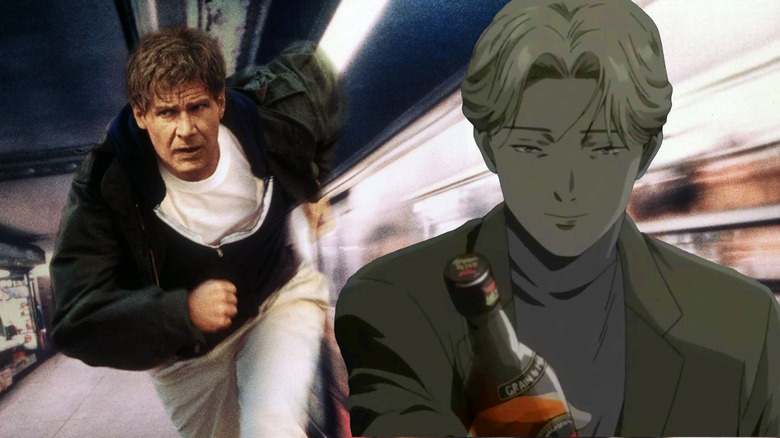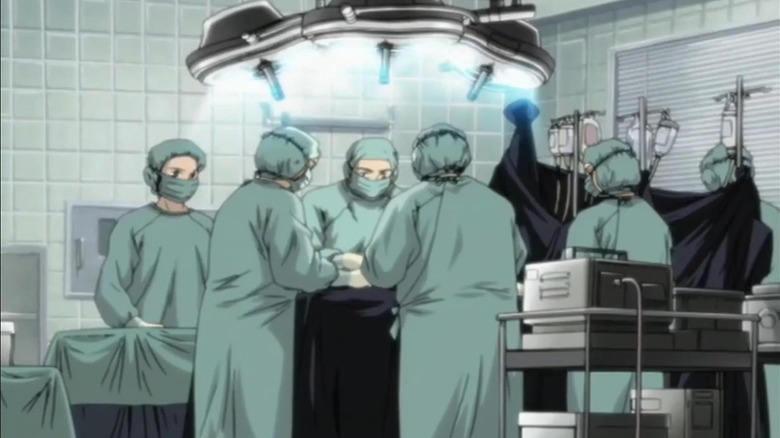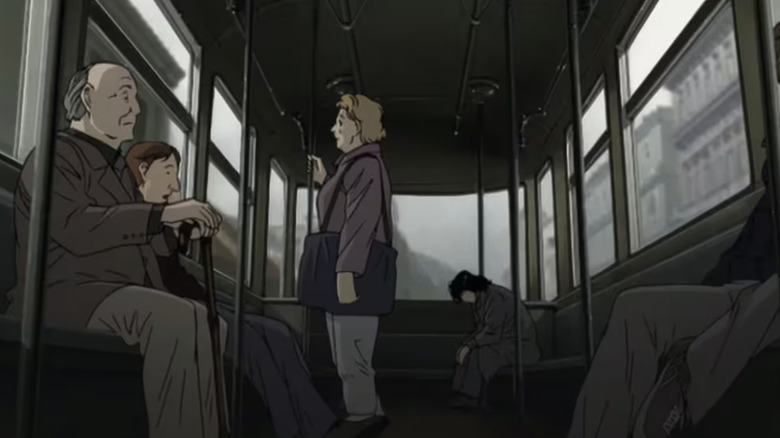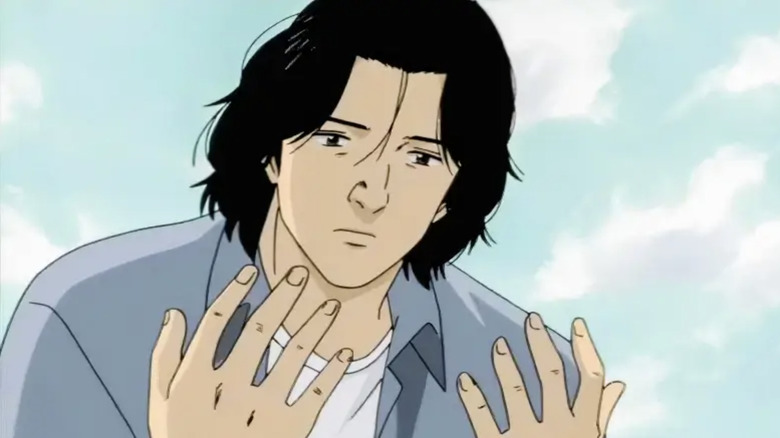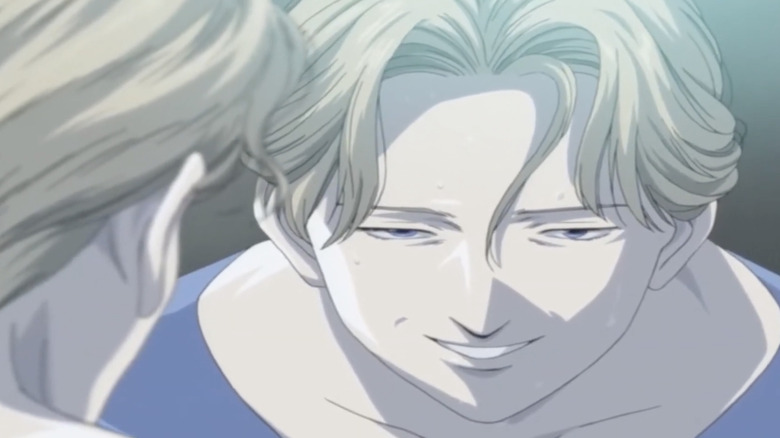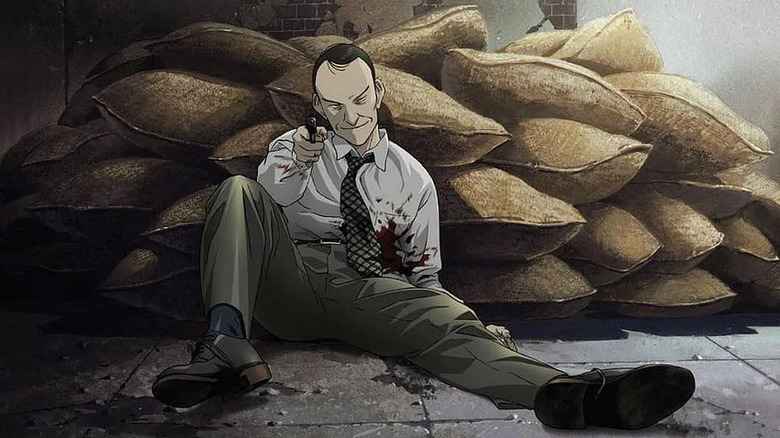This Horror Anime Is A Secret Remake Of A 60s TV Classic
"The Fugitive" ran for four seasons on ABC from 1963 to 1967. The series followed Dr. Richard Kimble (David Janssen), a (you guessed it) fugitive accused of murdering his wife. Pursued across the country by lawman Philip Gerard (Barry Morse), he tries to prove his innocence by finding the real killer.
On one hand, "The Fugitive" is as episodic as you'd expect from a 1960s TV show. Each episode features Kimble in a different town with a new problem to solve. The backstory is also told via title sequence; the first episode, "Fear in a Desert City," is just another adventure for Kimble, not the murder, trial, and Kimble's escape the way it would be today. However, there's also some serialization with the story threads of Gerard hunting Kimble and Kimble hunting the real murderer, a one-armed man (Bill Raisch). These reach their conclusion in the finale, "The Judgment."
With such a simple and exciting premise, "The Fugitive" has been remade many times. The 1993 Harrison Ford film is the most famous (read Ben Pearson's /Film interview with "The Fugitive" director Andrew Davis). In 2000, a TV remake was produced starring Tim Daly. Failing to piggyback off the success of the Ford movie, the show lasted one season.
1977's "The Incredible Hulk" was inspired by "The Fugitive" as much as the Marvel comic; David Banner (Bill Bixby) was on the run, jumping from town to town and alias to alias with every episode. Tabloid reporter Jack McGee (Jack Colvin) plays the part of Gerard.
In 2020, Ken Watanabe starred in a Japanese version of "The Fugitive" — "Tôbôsha." This isn't the first time Japan has remade "The Fugitive," for it also inspired the horror-thriller manga/anime "Monster."
Naoki Urasawa's Monster
The author of "Monster" is Naoki Urasawa. Born in 1960 in Tokyo, he was the right age to watch reruns of "The Fugitive" on Japanese TV. Speaking to the blog All the Anime in 2019, Urasawa confirmed "The Fugitive" TV series influenced the story he told with "Monster":
"I watched ['The Fugitive'] when I was about eight. The story is that a doctor is accused of murder, the detectives are chasing him and he must run away. That storyline really had an impact on me."
Indeed, it did. "Monster" has (on the surface) the same premise as "The Fugitive," down to three central characters who make up a triptych of hunters and the hunted. Dr. Kenzo Tenma, a neurosurgeon, is forced to go on the run after being framed for murders carried out by a former patient of his, Johan Liebert. Tenma hunts Johan and, in turn, Police Inspector Heinrich Lunge hunts him.
While Tenma is Japanese like his creator, "Monster" isn't set in Japan or America like "The Fugitive." Nope, it's set in contemporary Europe ("Monster" began publication in 1994; the story opens in 1986 but soon jumps ahead nine years). Tenma's story begins in Düsseldorf, Germany, and stretches across Frankfurt, Munich, and Prague, Czechoslovakia. Urasawa (who draws European architecture in photorealistic detail across the manga) explained the setting decision to Crunchyroll in 2019:
"I think in Japan, our medical industry was influenced by a lot of German technology at the time, so when we think of medicine in Japan, a natural association is Germany. So when I began to write 'Monster,' the protagonist is a doctor and setting the story in Germany seemed natural."
Post-Cold War Germany proved to be fertile narrative ground, for "Monster" explores scars left on Germany by the felled Nazi and Soviet regimes.
The Fugitive
Dr. Tenma is our fugitive. The series' title sequence "Grain" is many shots of him walking/running through German cities, blending into crowds, and looking over his shoulder while the eerie music keeps us as on edge as him.
However, in a telling difference of structure, he only goes on the run in episode 8, titled, what else, "The Fugitive" (corresponding to chapter 15 of the manga). The opening chapters detail Tenma's history with Johan; how he chose to save the boy's life over the city's mayor, which cost him his professional future until his boss was mysteriously murdered (by a grateful Johan, it eventually turns out). "Monster" is a slow burn, not a straight-to-the-action story like "The Fugitive."
"Monster" also has a more involved mystery than "The Fugitive" (one with more layers than an onion) and a sustained supporting cast, not one that swaps out every episode when Kimble heads somewhere new. However, the show can be as episodic as "The Fugitive" was. There are many episodes where Tenma meets a local who needs his help; some have connections to his mission, but many don't.
In episode 11, "511 Kinderheim," while investigating Johan's past, he saves an abused orphan named Dieter who follows him around like a sidekick for the rest of the series. In episode 32, "Sanctuary," while preparing to kill Johan, Tenma meets an aged Nazi soldier in a Munich forest. Ever since the old man stained his soul, the birds of the forest never sing for him, but they do for Tenma; can the doctor still shed his innocence after that?
The hands of a doctor
Then, in episode 34, "At the End of the Darkness," Tenma comes across a small clinic for undocumented immigrants. It's run by a 17-year-old Vietnamese girl, self-taught with her father's medical books, so Tenma puts his mission on pause to help her. He recognizes she became a doctor for the right reasons (much like himself) and urges her to keep it up.
Tenma's profession isn't incidental or a mere reference to Dr. Kimble, it's essential to his character. Like Charlie Cale (Natasha Lyonne) in "Poker Face," another "Fugitive" riff, Tenma's strength comes from his kind heart. A doctor's job is to save lives — yet Tenma spends the series trying to take one and defy his nature.
In Stephen King's/David Cronenberg's "The Dead Zone," the psychic Johnny (Christopher Walken) foresees a future nuclear war if Greg Stillson (Martin Sheen) is elected U.S. President. He turns to his doctor Sam Weizak (Herbert Lom), a Holocaust survivor, for advice; would he kill Hitler despite his Hippocratic Oath? Weizak says he'd have to kill Hitler because of the Oath since it is a promise to save lives. This is Tenma's mindset for most of the story; he resurrected a serial killer and it's his responsibility to undo that mistake.
One of Urasawa's other influences is "Astro Boy," the manga classic by Osamu Tezuka (in 2003, he wrote his own "Astro Boy" with "Pluto"). Astro Boy is an android created by a scientist to replace his dead son. When the scientist rejects him, Astro becomes a superhero. What was the name of Astro's father? Dr. Tenma. Urasawa hasn't (to my knowledge) explained why he nicked the name for "Monster," but I've noticed a connection. Both Dr. Tenmas brought a young boy back to life ("Astro Boy" Tenma with robotics, "Monster" Tenma with surgery) and didn't get what they'd bargained for.
The killer
In "The Fugitive" TV series, the One-Armed Man was a simple burglar who killed Helen Kimble during a home robbery. Fine for the TV series where the chase felt vaguer, but the movie needed something grander. So there, the one-armed man, Fredrick Sykes (Andreas Katsulas), was a hitman hired to kill Kimble by pharmaceutical company Devlin MacGregor; Kimble discovered their new drug Provasic caused liver damage and they wanted to silence him. Sykes accidentally killed Kimble's wife instead.
In both versions, Kimble's quarry is ultimately a petty crook. Johan Liebert, though? He's a totally different Beast — a biblical one, as warned of in the Book of Revelation 13:1-4 (the passage which opens "Monster"). Johan probably isn't the literal Antichrist, but he thinks of himself as an inhuman "nameless monster."
He can drive people to suicide with the right words, Neo-Nazis want him to lead them into a Fourth Reich, and he dares an old man to see Hell by staring into his eyes. Compared to the cowardly one-armed man, Johan is a mastermind more like Hannibal Lecter (minus the cannibalism, though one of Johan's acolytes is convinced their master is a vampire).
Urasawa wanted his story to have a handsome villain (partially to help sales), but he kept Johan's features hidden at first. When Tenma meets the adult Johan, he's shown in shadows. It's only after he ruthlessly murders someone that Tenma, and the audience, see Johan's boyish good looks.
Johan's design might seem like simple "don't judge a book by its cover" symbolism, and indeed he does snare many victims with his kind face. There's another layer though; it reflects the story's theme that "monsters" are mere humans. Johan isn't a demon, just a child raised without love.
The detective
That brings us to the third player, the detective pursuing our fugitive while unaware of the frame-up.
Some might say that Lieutenant Samuel Gerard (reimagined as a U.S. Marshall), as played by Tommy Lee Jones, was the best part of the 1993 "Fugitive" (Jones got an Oscar for Best Supporting Actor, after all). Playing Gerard as a stern good old boy who's all business in his pursuit of Kimble, he definitely feels like the hero of his own story (Jones/Gerard also got a spin-off, "U.S. Marshals," so a producer agreed). He needed to, for the film does a condensed version of the show's arc where Gerard slowly realizes Kimble's innocence. That goes down easier if the audience already likes Gerard before he knows the truth.
Inspector Lunge in "Monster" pursues Tenma with the same doggedness and audacity that Gerard pursued Kimble. (Episode 22, "Lunge's Trap," features the Inspector taking advantage of a separate murder investigation to lure Tenma out.) Urasawa even draws Lunge with some of the original Gerard actor Barry Morse's facial features: a slim face, a pointed nose, and a balding forehead.
While Gerard is just doing his job (see the famous "I don't care [that you're innocent]" scene in the 1993 movie), Lunge is more resolute. He suspected Tenma ever since Johan murdered the hospital director in 1986 and catching the doctor will satisfy his intellectual need to triumph. When Lunge analyzes a crime scene, he moves his fingers like he's typing to help himself memorize information. From this tic to his disinterest in socializing, he feels more like Sherlock Holmes (English Dub actor Richard Epcar even voices him with an imposing monotone) than Gerard.
While "Monster" took the set-up of "The Fugitive" and ran with it, the story became so much more.
